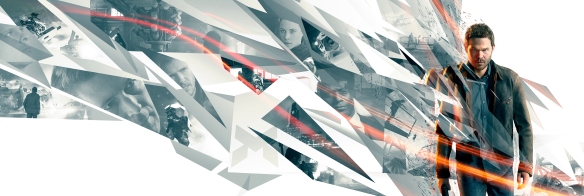
Remedy Entertainment’s Quantum Break is a peculiar title. A game that, roughly twenty minutes in, had me audibly laughing at what it proposed. A multi-media, live-action hybrid –– starring Littlefinger from Game of Thrones –– and with a script seemingly riddled with pseudo–scientific cliche. It felt preposterous, indulgent and woefully overproduced. But what transpired was a title that, in time, won my attention. One that I actually grew to enjoy; even mull over its meandering narrative whilst away from my console. A game that, for all its shortcomings, left me suitably intrigued all the way through to its closing credits.
Quantum Break is a far from perfect game. But it is an ambitious, cross-media form of entertainment. It merges AAA-budget gameplay with live action sequences that feature the actors and characters we encounter along the way. Its story, gravitates around a flawed by engaging time-travelling thriller, one that actively rewards your engagement with it. In fact, through its campaign the player is given a number of ‘choose your path’ options, which changes both the direction of the game and the episodes we watch in tandem. It’s an altogether noble premise –– one that feels worthy of your time –– if not entirely for concept over execution.
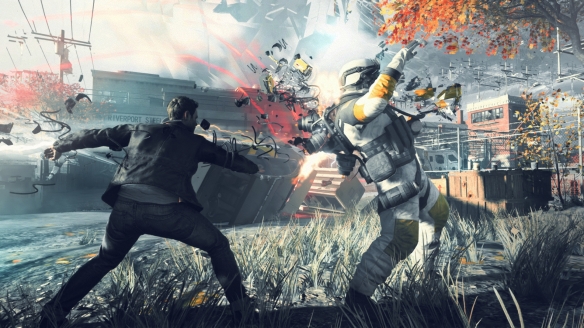
Of course, its premise isn’t entirely new. A relatively forgettable protagonist (Jack Joyce) is drawn into a time-travelling conspiracy, no thanks to his genius brother’s machine that –– shock, horror –– disrupts the space time continuum. It borrows philosophy from many of this genre: playing on whether time is fixed or if we can carve our own fate. But it does offer a heightened sense of interactivity and replay-ablity, by providing different paths and supplementary material.
For example, the evolving narrative plays on the idea of time ‘fracturing’, with disruptions becoming more pertinent as we try to reverse the effects of the machine. These fractures affect the gameplay quite tangibly –– literally causing time to freeze and fluctuate –– which reflects a genuine mediation of the different mediums at play. Moreover, navigating the ever-changing timeline(s) encourages a closer reading of its story: something that is satisfied through the live action shorts and [frankly colossal] amount of material presented through in-game collectables. Quantum Break, in many ways, leans on more traditional methods of storytelling when appropriate. Sometimes it uses filmed media, sometime it tells short-stories through diary entries or office emails. This doesn’t always work –– which I address in due course –– but it all serves to enrich the surrounding world. And it certainly demonstrates what can be achieved by taking this broader approach.
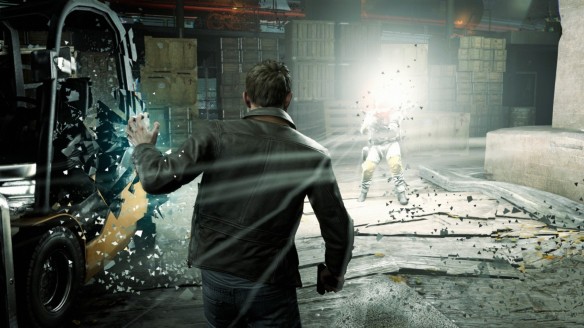
In fact, there are moments of true ingenuity. As the player develops a clearer understanding of what is at stake –– largely through said collectibles –– character motivations become inherently more conflicted. The main antagonist, Paul Serene (Aiden Gillen) –– who I consider the strongest asset in the game –– has his justification for opposing Joyce. His empire and ‘Noah’s Ark for the elite’ seems increasingly more logical when read from his side. This actually amalgamated to the point where I began questioning my role as the protagonist and whether or not I was indeed the villain. Yet this development is best conveyed through his laptop and diary entries, rather than the somewhat ropey dialogue during their animated cinematics. Which suggests that this cross-media approach can compliment, even rectify, the main vessel of storytelling throughout the game.
There are some shortcomings to this ambition, though. Whilst Serene and Joyce carve a decent binary, the supporting figures –– namely Charlie Wincott and Fiona Miller –– feel a little half-baked. At times, they seem added almost entirely to satisfy the need for live action segments, with only Liam Burke and Beth Wilder significantly confronting Joyce in-game. Putting faces to emails does’t feel entirely warranted, nor are their on-screen escapades particularly interesting, either. And the story more-often-than-not relies on McGuffins to justify its linearity. With that said, Wilder’s arc eventually reaps some well punctuated heartfelt moments and Martin Hatch adds a compelling third-wheel; one that welcomes a second play-through. Especially given the convoluted ending.

As for the gameplay itself? Quantum Break sits somewhere rather awkwardly. It boasts a generic but perfectly serviceable run-and-gun mechanic –– with Timesplitters style ‘super-powers’ to combat harder foes. It’s fun and for the most part well paced; with platforming segments really utilising the breadth of these time effects. But it seems on the whole at odds with the easter-egg hunt for exposition that defines the bulk of its storytelling. Large shoot-outs are often offset by frantic email-reading and collectable scouring. This can become jarring and is only heightened by the fact players have to watch up to thirty minute episodes before each chapter, cueing an inevitable desire to jump straight into the action to little-to-no avail. Frankly, it’s for this reason I feel Quantum Break never manages to capitalise on its true potential. Its live action sequences are not written well enough to stand up as television and its gameplay isn’t engaging enough to make for a solid action title, either. It has moments where the two mediums compliment each other effectively –– at times wonderfully –– but it generally spreads itself a little thin. Which is a shame, because when the platforming/action/story-telling work in harmony, it’s damn good fun. And the long, unwinding plot certainly accommodates it.
Its production values, conversely, deserve almost unanimous praise. The live action sequences have a glossy, ‘4K’ tinge to its digital photography, with a sterility that matches the animated characters rather well. The game, too, runs and looks fantastic. The set-pieces are bold and there are moments –– especially when avoiding collapsing environments –– that feel genuinely exhilarating. If its aim was to blur the lines between filmed and computerised entertainment, then it does a fine job of striking that conjecture. It is an immersive ordeal, one that is improved exponentially by how willing the player is to buy into it. No doubt, Quantum Break boasts a confidence in its every step it takes: something that is mirrored in every expensive camera angle, in-game collectable or blockbuster level design. Even if that confidence is a little misplaced.
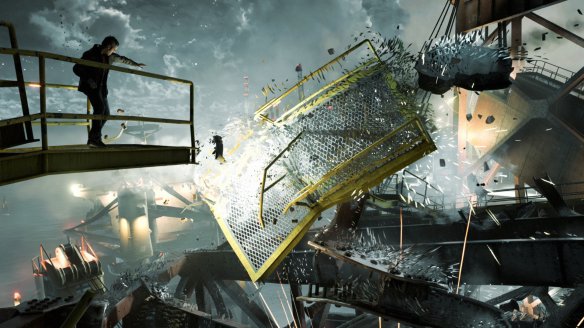
On reflection, I think my immediate hostility towards Quantum Break lies in misunderstanding. It is a grossly overblown thriller, with outrageous production values and its fair share of cliche. For many, it is hard to look past that. Yet all the same it’s a narrative and text-heavy adventure. One that is far more sensitive and slow-burning than its car chases and shoot-outs would have you believe. And if you’re willing to get on board with it’s frivolity –– by reading the in-game collectables, levelling-up your powers and weighing up the pathway options –– it offers something of a rewarding narrativised journey. My initial play-through became notably more enjoyable as I dug deeper into this muddled world. It’s also a considerably lengthy game by modern standards. No doubt this is buffed out by the live action segments, but it’s certainly in the double figures, which is surprising given its linearity. This is not a free-roaming RPG –– at times it’s little more than glorified quick time event –– yet it still maintains a longevity in its story telling. Which is a noble feat.
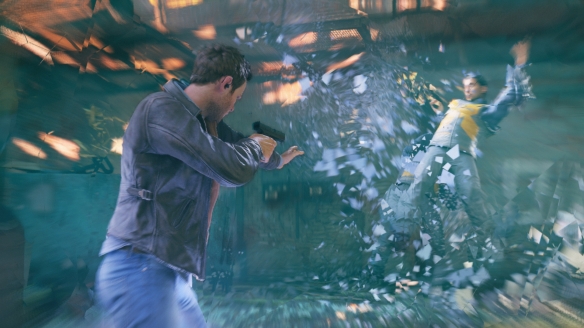
Above else, though, Quantum Break is a charming, daring but equally frustrating experience. It remains a deeply pretentious and self-assured ‘creative project’. And in terms of gameplay, it brings little new to the proverbial table. But it’s still a title that won me over. A game that had me engrossed; despite my initial skepticism. A game that feels like a conceptional masterstroke, even if its struggles to balance the tempo of its combat, live action and seemingly endless endeavour to collecting things. In many ways, it feels let down by the very ambition that makes it an interesting game. It’s glaring faults come as a result of its dizzying heights. But it is, if anything, a title that encourages an active engagement with its storytelling, whilst trying to discover new ways to do precisely that.
* * *
Quantum Break is Microsoft’s glossiest IP. Whether or not it achieved its divine goals of cementing the Xbox One as a gaming machine has yet to be seen. It certainly divided opinion upon launch in 2016 –– and it’s perfectly clear why it did just that. But in an era where single-player games invariably play it safe: the blind ambition of what is attempted here earns its dues, regardless if it falls short of its full potential. Quantum Break is, in my opinion, worth your time –– even if that time, or indeed your concept of time –– will be thrown through a blender of Whovian nonsense by the end of it.
